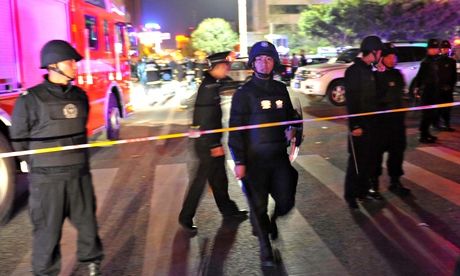China horrified as mass stabbings at Kunming rail station leave dozens dead
Unidentified raiders shot by police after 'violent terror attack' at crowded ticket hall in Yunnan province, south-west China
China was reeling from what was described as a "violent terror attack" on Saturday in which a knife-wielding gang stabbed 28 people to death and left scores more injured at a railway station.
Motives for the killings at Kunming in Yunnan province, south-west China, were unclear, but Beijing has blamed similar attacks on militants from Xinjiang in the country's restive north-west.
Reports said five unidentified attackers were shot dead by police following the incident on Saturday evening and another five were being hunted. Unverified photographs circulating on social media appeared to show the blood-soaked bodies of victims lined up on the floor. Other images showed distraught people running away from the station and crowds gathering among police officers and ambulances.
Weibo users took to the social network to explain what happened, though many of those posts were quickly deleted by government censors, especially those that described the attackers, two of whom were identified by some as women. Others condemned the attack.
"No matter who, for whatever reason, or of what race, chose somewhere so crowded as a train station, and made innocent people their target – they are evil and they should go to hell," wrote one user.
The official Xinhua news agency said at least 113 people were injured in the "organised, premeditated" attack by "unidentified knife-wielding people". The victims were taken by ambulances to hospitals around the city.
No reason for the killings was given, but state television described them as an act of terrorism – a term Beijing usually deploys to describe the activities of minority ethnic groups it charges with fomenting unrest in outlying regions such as Xinjiang.
Chinese TV said the country's top police official, Meng Jianzhu, was on his way to the scene.
Yang Haifei, who was wounded in the chest and back, told Xinhua he had been buying a train ticket when the attackers approached and he had tried to escape with the crowd. "I saw a person come straight at me with a long knife and I ran away with everyone," he said. Others "simply fell on the ground".
Some who escaped were desperately searching for missing family. "I can't find my husband, and his phone went unanswered," said Yang Ziqing, who had been waiting to catch a train to Shanghai when the knife gang struck.
Eyewitnesses were quoted by the China News Service saying the attackers, dressed in black, "burst into the train station plaza and the ticket hall, stabbing whoever they saw".
The website of the state-run People's Daily newspaper said the gang struck at 9pm local time on Saturday, hacking into victims who it said were "passersby". It said the station had been cordoned off and more than 120 police, firefighters and security officers deployed to the scene.
Kunming, about 1,300 miles southwest of Beijing, is a bustling university town and major commercial hub on trade routes linking southern China to neighbouring Vietnam.
The attack comes at a particularly sensitive time as China gears up for the annual meeting of parliament, which opens in Beijing on Wednesday and is normally accompanied by a tightening of security across the country.
China has blamed similar incidents in the past on Islamist extremists operating in the restive far western region of Xinjiang, though such attacks have generally been limited to Xinjiang itself. China says its first major suicide attack, in Beijing's Tiananmen Square in October, involved militants from Xinjiang, home to the Muslim Uighur people, many of whom resent Chinese restrictions on their culture and religion.
Hu Xijin, editor of the influential Global Times newspaper, published by the ruling Communist party's official People's Daily, wrote on his Weibo page that the government should say who it suspected of the train station attack as soon as possible.
"If it was Xinjiang separatists, it needs to be announced promptly, as hearsay should not be allowed to fill the vacuum," Hu wrote.
In July 2008 the city was hit by two explosions on board separate public transport buses, leaving two dead. Officials did not classify the blasts as acts of terrorism and later dismissed reports that they were claimed by a Xinjiang separatist group.





